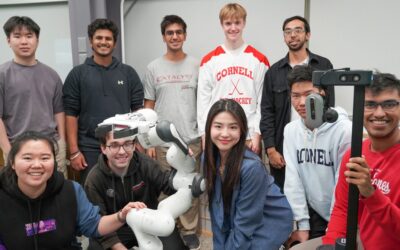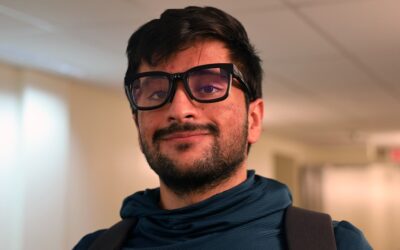danah boyd will be joining Cornell University’s College of Agriculture and Life Sciences to pursue her passion for teaching, working with students and conducting research at the intersection of technology and society. Drawn by Cornell’s high density of collaborators and welcoming academic community, she looks forward to becoming a member of the Department of Communication faculty. Learn more about her research interests and projects.
Cornell AI News
News Category
Filter by Topic
Choudhury wins Navy Young Investigator award to train robots
Sanjiban Choudhury, assistant professor of computer science in the Cornell Ann S. Bowers College of Computing and Information Science, just received a three-year, $750,000 Young Investigator Program award from the Office of Naval Research (ONR) to develop new ways to train robots to perform complex, multistep tasks, such as inspecting and repairing ship engines.
Race-blind college admissions harm diversity without improving quality
Critics of affirmative action in higher education have argued that the policy deprives more qualified students of a spot at a university or college. A new study by Cornell researchers finds that ignoring race leads to an admitted class that is much less diverse, but with similar academic credentials.
Cornell Tech alumni close $3.2 million seed round for Avina
Ron Fisher ’16, founded Avina with partners Michael Wang ’16 and Vivek Sudarsan ’16, all three of whom are graduates of Cornell Tech.
Cornell Tech’s economic impact on NYC to double by 2030
A new analysis finds that Cornell Tech, its alumni and its 115 startups achieved $768 million in total economic impact and supported 2,800 jobs in New York City in the 2023-24 fiscal year.
New statistical method powers research on health, climate, financial data
Machine learning and artificial intelligence wouldn’t be possible without the statistical models that underpin their analytic capabilities. A Cornell statistician and his colleague have developed a revolutionary new method to analyze complex datasets that’s more flexible, accurate and easy to use.
Student creates smart glasses for people with hearing loss
Nirbhay Narang ’25 has created smart glasses to help people manage this situation. The glasses use AI to provide transcriptions of conversations in real time, which can be viewed both on the glasses and on a phone.
Researchers in climate science, nanoparticles among 12 newest Eric and Wendy Schmidt AI in Science Postdoctoral Fellows
Nanoparticles that could change material science. Better models to predict the potential for global carbon offsets. More efficient and cheaper solar panels. These are some of the research projects from 12 of the newest Eric and Wendy Schmidt AI in Science Postdoctoral Fellows from Cornell.








